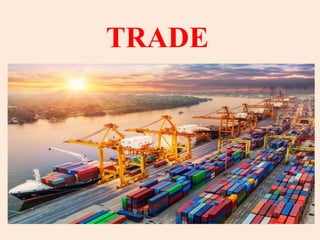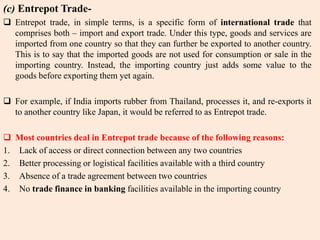Trade
- 1. TRADE
- 2. TRADE The word “Trade means buying, selling and exchange of goods.” Trade may be described as the nucleus of commercial activity. A trader purchases goods to be sold to other traders or consumers at a profit. Generally he buy those goods which are in demand or which are likely to find in the market. Sometime they may get good margin on profit but sometime they may go in loss. The producers build the goods, then it transfer to the whole seller, then to a retailer and finally reached to the consumer. Traders act as intermediaries between producer and consumers.
- 3. Classification of Trade Trade generally classified into two broad categories' 1- Internal Trade 2- International Trade Internal Trade Foreign Trade
- 4. 1- Internal trade It is also called home trade and consist of sale and exchange of goods within the boundaries of a country. The payment involved in business transaction are made in the nation’s own currency directly or through banking system. The movements of goods is through internal transport system owned by state government, central government or by any private agencies. The internal trade is carried on the following basis:- 1. Wholesale trade 2. Retail trade
- 5. Wholesale Trade They are the people who buy in bulk from the producers and sell in small quantities to the retailers. The wholesaler served as a link between the procedure or manufacturer of goods and the retail traders. Drug Mfg plant Finished Drug Product
- 6. Retail Trade Retailers are the traders who buy goods from wholesalers or sometimes directly from producers and sell them to the consumers. They usually operate through a retail shop and sell goods in small quantities. They keep a variety of items of daily use. Retailer act as a link between wholesaler and the actual consumer. In Pharmaceutical trade, the chemist or the druggist plays the role of a retailer. Thus a retailer chemist in a outlet for providing drugs or health-care services to the patient. A retailer dispenses the prescription of the medical practitioner and sells medicines to a patient.
- 7. International Trade or Foreign Trade International trade refers to the exchange of goods and services between the countries. In simple words, it means the export and import of goods and services. Export means selling goods and services out of the country, while import means goods and services flowing into the country. International trade supports the world economy, where prices or demand and supply are affected by global events. The movement of goods is through international transport system.
- 8. Types of International Trade Foreign trade is conducted mostly on wholesale basis and is subdivided in to:- (a) Import trade (b) Export trade (c) Entrepot trade (a) Import- Import trade means purchasing goods and services from a foreign country because they cannot be produced in sufficient quantities or at a competitive cost in your own country. For example, India imports 80-82% of its crude oil requirements from countries like UAE and Venezuela. This is because these countries possess massive oil fields and are quite competent in exploring, processing, and transporting oil at an economical rate. Similarly, UAE imports agriculture and apparel based products from India because it is easier and cheaper to import these, rather than produce them in their own country.
- 9. (b) Export Trade- Quite like its import counterpart, export trade is a type of international trade which relies on selling locally manufactured goods and services to foreign countries. In theory, it is considered to be just the opposite of import trade. For example, India exports inorganic chemicals, oilseeds, raw ores, iron and steel, plastics, and dairy products to a country like China. In return, China exports electrical equipment, organic chemicals, silk, mineral fuels, and fertilizers to India. These goods are exchanged between both countries so that they can make the most of their respective production capacities.
- 10. (c) Entrepot Trade- Entrepot trade, in simple terms, is a specific form of international trade that comprises both – import and export trade. Under this type, goods and services are imported from one country so that they can further be exported to another country. This is to say that the imported goods are not used for consumption or sale in the importing country. Instead, the importing country just adds some value to the goods before exporting them yet again. For example, if India imports rubber from Thailand, processes it, and re-exports it to another country like Japan, it would be referred to as Entrepot trade. Most countries deal in Entrepot trade because of the following reasons: 1. Lack of access or direct connection between any two countries 2. Better processing or logistical facilities available with a third country 3. Absence of a trade agreement between two countries 4. No trade finance in banking facilities available in the importing country
- 11. Advantages and Disadvantages of International Trade Advantages:- Optimal use of natural resources • Global trade helps countries to make optimum use of their natural resources. Each nation concentrates on the production of those products for which the resources are available in abundance and best suited. Availability of a wide variety of goods • It lets a country, it import items which are not produced due to higher costs or other issues. Likewise, selling goods to foreign countries allows a nation to get rid of its excess production. Specialization • Foreign trade results in specialization and promotes manufacturing of different products in different nations. Due to competitive advantages, goods can be produced at a relatively low cost, and this benefit all countries. Increased efficiency • Since international trade is highly competitive, produces in any country tries to make good quality products at low rates. This in turn boosts efficiency and benefits customers all over the world.
- 12. Establishment of new industries and exchange of technique and technology: • Underdeveloped nations are able to establish new industries with the technical know-how, machinery and equipment imported from developing and developed nations. As such, underdeveloped countries are able to develop speedily. Understanding and cooperation between countries: • Through global trade, people of different regions come in close contacts with each other. As a result of this, understanding, co-operation and cordial relations tend to build up among nations at large. Foreign Exchange: • A country is able to earn valuable foreign exchange by exporting its goods to other countries. With the help of foreign exchange it can purchase goods of its need from other countries. Culture development • The trade people of different countries come in contact with each other through international trade. They learn about each other’s culture qualities.
- 13. Disadvantages:- Impediment in the Development of Home Industries: • International trade has an adverse effect on the development of home industries. It poses a threat to the survival of infant industries at home. Due to foreign competition and unrestricted imports, the upcoming industries in the country may collapse. Economic Dependence: • The underdeveloped countries have to depend upon the developed ones for their economic development. Such reliance often leads to economic exploitation. For instance, most of the underdeveloped countries in Africa and Asia have been exploited by European countries. Mis-use of Natural Resources: • Excessive exports may exhaust the natural resources of a country in a shorter span of time than it would have been otherwise. This will cause economic downfall of the country in the long run. Trade Wars: • International trade breeds rivalries amongst nations due to competition in the foreign markets. This may eventually lead to wars and disturb world peace.
- 14. Effect on culture: • There are so many goods which are not suitable in accordance with our couture and traditions etc. The import of these goods affect our culture and civilization. Shortage of goods in a country: • To earn more profits, sometimes the traders prefers to sell the goods to other countries than in their own country. This results in the shortage of goods within the country.















